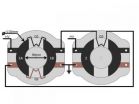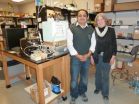(Press-News.org) COLUMBIA, Mo. – Every person has some level of alexithymia, as it is the personality trait which keeps people from sharing or even understanding their own emotions. Now, one University of Missouri researcher's latest study indicates that affectionate communication, such as hugging, could help those who have high levels of alexithymia lead more fulfilling lives.
Colin Hesse, an assistant professor of communication in the MU College of Arts and Science, said previous studies estimate 8 to 10 percent of people suffer from high alexithymia. Those who have high alexithymia have trouble relating to others, as they tend to become anxious around others or avoid forming relationships. Alexithymia is often found with other conditions on the autism spectrum, as well as post-traumatic stress disorders. Studies have shown that alexithymia has been related to eating and panic disorders, as well as substance abuse.
"We know how important it is for people to empathize and be open with the people around us, because that makes someone more competent as a communicator," Hesse said. "We still need to study the best approaches, but we believe that affectionate communication ranging from hugs, touching, or even the posture taken during communication – can make a positive impact, even if it only relieves anxiety."
In the paper "Affection Mediates the Impact of Alexithymia on Relationships," published in the journal Personality and Individual Differences, Hesse and Kory Floyd of Arizona State University surveyed 921 people and measured shared affection, attachment levels, and the number of close relationships. The researchers found that even though alexithymia was negatively related to forming relationships, the impact was lessened by giving and receiving higher amounts of affectionate communication.
While alexithymia is still relatively new to the scientific world, some scholars believe it may eventually be added to the Diagnostic and Statistical Manual of Mental Disorders. As a communications expert, Hesse is studying the ways alexithymia sufferers can ease the physical and mental costs of the affliction and succeed at relationships.
Hesse's previous work has shown that affectionate communication releases hormones that relieve stress, and his future studies will be applicable to all forms of communication.
"Because there is so much gray area with alexithymia, the potential for what we learn could have benefits for people with conditions such as emotional distance and autism spectrum disorders," Hesse said. "I want to help alexithymia sufferers understand the undercurrent of the messages sent from other people."
INFORMATION:
Having trouble sharing or understanding emotions? MU researcher believes affection could help
Survey shows those with high level of emotional disconnection disorder need to learn empathy
2011-04-07
ELSE PRESS RELEASES FROM THIS DATE:
Hypothermia proven to improve survival and outcomes following out-of-hospital cardiac arrest
2011-04-07
New Rochelle, NY, April 6, 2011 – The successful use and evaluation of therapeutic hypothermia to improve survival and reduce the risk of neurological consequences following an out-of-hospital heart attack are explored in the premier issue of Therapeutic Hypothermia and Temperature Management, a new quarterly peer-reviewed journal published by Mary Ann Liebert, Inc. This groundbreaking new publication covers all aspects of hypothermia and temperature considerations relevant to this exciting field, including its application in cardiac arrest, spinal cord and traumatic brain ...
SSA Considering Fast-Tracking Heart Disease-Related Disability Claims
2011-04-07
In our current Social Security system, children and adults who have developed disabilities as a result of cardiovascular disease may have to wait months or longer before they receive Social Security Disability Insurance (SSDI) or Supplemental Security Income (SSI) benefits. Recognizing the importance of expediting the process for these individuals, the Social Security Administration (SSA) recently held a Compassionate Allowances public outreach hearing to explore ways the agency can evaluate claims for SSDI and SSI benefits for those who have heart disease-related disabilities.
SSA ...
New discovery proves cause of weight problems in Huntington's disease
2011-04-07
The study, which has been published in the scientific journal Cell Metabolism, shows significant changes in the brain's hormone control centre, the hypothalamus. In a series of experiments on mice, which had the mutated Huntington's protein injected into this area of their brains, the animals soon demonstrated a reduced ability to regulate their metabolism.
"With the selectively produced mutated protein, we saw immediate changes; the mice started to eat more and became very fat. We have now been able to prove that there is a causal relationship between this mutated protein ...
Gene linked to severity of autism's social dysfunction
2011-04-07
With the help of two sets of brothers with autism, Johns Hopkins scientists have identified a gene associated with autism that appears to be linked very specifically to the severity of social interaction deficits.
The gene, GRIP1 (glutamate receptor interacting protein 1), is a blueprint for a traffic-directing protein at synapses — those specialized contact points between brain cells across which chemical signals flow.
Identified more than a decade ago by Richard L. Huganir, Ph.D., professor and director of the Solomon H. Snyder Department of Neuroscience at the Johns ...
Treating newborn horses: A unique form of pediatrics
2011-04-07
CHAMPAIGN, Ill. — Like any other newborn, the neonatal horse can be a challenging patient. Its immune system is still under construction, its blood chemistry can vary wildly, and – like most infants – it wants to stay close to mom.
These factors are magnified in the critically ill foal, said Pamela Wilkins, a professor of equine internal medicine and emergency/critical care at the University of Illinois and the author of a new paper on equine neonatal intensive care.
The paper, in Clinical Laboratory Medicine, offers guidance to the large-animal veterinarian and demonstrates ...
Recovery Slow for Arizona's Stressed Economy
2011-04-07
In spite of the fact that the number of new bankruptcy filings actually fell for several straight months in 2010, the year still resulted in a record number of filings -- nearly 30,000 in all -- in the Phoenix metro area. That is higher than financial industry experts initially forecast and shows that much of Arizona's economy is still in recession mode. The new record is nearly 5,000 filings more than the previous one set back in 2005 (as thousands tried to take advantage of lax bankruptcy rules before sweeping changes took effect in October of that year).
The high ...
Replacing batteries may become a thing of the past, thanks to 'soft generators'
2011-04-07
Battery technology hasn't kept pace with advancements in portable electronics, but the race is on to fix this. One revolutionary concept being pursued by a team of researchers in New Zealand involves creating "wearable energy harvesters" capable of converting movement from humans or found in nature into battery power.
A class of variable capacitor generators known as "dielectric elastomer generators" (DEGs) shows great potential for wearable energy harvesting. In fact, researchers at the Auckland Bioengineering Institute's Biomimetics Lab believe DEGs may enable light, ...
Common nanoparticles found to be highly toxic to Arctic ecosystem
2011-04-07
Queen's researchers have discovered that nanoparticles, which are now present in everything from socks to salad dressing and suntan lotion, may have irreparably damaging effects on soil systems and the environment.
"Millions of tonnes of nanoparticles are now manufactured every year, including silver nanoparticles which are popular as antibacterial agents," says Virginia Walker, a professor in the Department of Biology. "We started to wonder what the impact of all these nanoparticles might be on the environment, particularly on soil."
The team acquired a sample of soil ...
Common Safety Myths Can Cause More Harm than Good to Motorcyclists
2011-04-07
There are many misunderstandings circulating about the best ways for motorcycle riders to avoid being involved in accidents with other cars. In some cases, these myths about motorcycle accidents can do more harm than good -- and put motorcyclists' lives at risk.
Motorcycle riders are eight times more likely than those in passenger vehicles to be seriously injured in an accident and 35 times more likely to die in an accident. With these statistics in mind, it is important for motorcyclists to know the best ways to protect their safety - and what legal options they have ...
Micro aircraft IMPULLS improves avionic systems and sensors
2011-04-07
A novel test aircraft of the TU Muenchen successfully completed its maiden flight yesterday at the airfield of the MFC Red Baron near Heimstetten. The micro aircraft christened "IMPULLS" (Innovative Modular Payload UAV – TUM LLS) will facilitate testing aviation sensors and systems. It was jointly developed by postgraduate students at the Institute of Aircraft Design and the Institute of Flight System Dynamics in Garching. Propelled by a compact electric motor, the aircraft flies quietly and free of emissions.
A particularly important feature of the novel design is its ...
LAST 30 PRESS RELEASES:
Mount Sinai, Uniformed Services University join forces to predict and prevent diseases before they start
Science of fitting in: Do best friends or popular peers shape teen behavior?
USF study: Gag grouper are overfished in the Gulf; this new tool could help
New study from Jeonbuk National University finds current climate pledges may miss Paris targets
Theoretical principles of band structure manipulation in strongly correlated insulators with spin and charge perturbations
A CNIC study shows that the heart can be protected during chemotherapy without reducing antitumor efficacy
Mayo Clinic study finds single dose of non-prescribed Adderall raises blood pressure and heart rate in healthy young adults
Engineered immune cells show promise against brain metastases in preclinical study
Improved EV battery technology will outmatch degradation from climate change
AI cancer tools risk “shortcut learning” rather than detecting true biology
Painless skin patch offers new way to monitor immune health
Children with poor oral health more often develop cardiovascular disease as adults
GLP-1 drugs associated with reduced need for emergency care for migraine
New knowledge on heritability paves the way for better treatment of people with chronic inflammatory bowel disease
Under the Lens: Microbiologists Nicola Holden and Gil Domingue weigh in on the raw milk debate
Science reveals why you can’t resist a snack – even when you’re full
Kidney cancer study finds belzutifan plus pembrolizumab post-surgery helps patients at high risk for relapse stay cancer-free longer
Alkali cation effects in electrochemical carbon dioxide reduction
Test platforms for charging wireless cars now fit on a bench
$3 million NIH grant funds national study of Medicare Advantage’s benefit expansion into social supports
Amplified Sciences achieves CAP accreditation for cutting-edge diagnostic lab
Fred Hutch announces 12 recipients of the annual Harold M. Weintraub Graduate Student Award
Native forest litter helps rebuild soil life in post-mining landscapes
Mountain soils in arid regions may emit more greenhouse gas as climate shifts, new study finds
Pairing biochar with other soil amendments could unlock stronger gains in soil health
Why do we get a skip in our step when we’re happy? Thank dopamine
UC Irvine scientists uncover cellular mechanism behind muscle repair
Platform to map living brain noninvasively takes next big step
Stress-testing the Cascadia Subduction Zone reveals variability that could impact how earthquakes spread
We may be underestimating the true carbon cost of northern wildfires
[Press-News.org] Having trouble sharing or understanding emotions? MU researcher believes affection could helpSurvey shows those with high level of emotional disconnection disorder need to learn empathy





